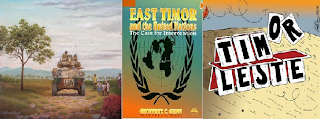by William D. Hartung
 Table of Contents
Table of ContentsIntroduction
Soeharto and U.S Arms
F-16 Pending Project
Who will pick up the tab?
Introduction: The Issue of Arms to Indonesia Heats Up
The events of the past year have cast a harsh spotlight on the longstanding U.S. government policy of providing weapons and military training to Indonesia. The awarding of the 1996 Nobel Peace Prize to Bishop Carlos Ximenes Belo and José Ramos-Horta, activists in the struggle to reverse Indonesia's brutal occupation of East Timor, has reinforced international concerns about the legitimacy of continuing U.S. arms sales to the Suharto regime. Congressional investigators have been probing the role of contributions from the Indonesian-based Lippo group in the 1996 presidential campaign, and upcoming public hearings will address the question of how these foreign donations may have influenced U.S. policy toward Indonesia.
In the meantime, the human rights situation on the ground in Indonesia appears to be getting worse. In June of 1996, the Suharto regime engineered the ouster of Megawati Soekarnoputri as head of the opposition Partai Demokrasi Indonesia (PDI), sparking what Human Rights Watch has described as "the most serious riot in Jakarta in two decades." The government then arrested Muchtar Pakpahan, the head of Indonesia's largest independent labor union, on specious charges of inciting the riots. Pakhapan and a dozen other labor and student leaders are now being tried on charges of subversion that could result in long prison sentences or even the death penalty for the "crime" of criticizing the Suharto regime.
In the midst of these developments, the Clinton Administration is planning to sell at least 9 F-16 fighter aircraft to Indonesia, the first U.S. sale of major combat aircraft to Jakarta in over a decade. The total F-16 package, including upgrades, spare parts, and support equipment, will be worth roughly $200 million. The deal has been postponed several times, first in response to the crackdown on dissent in Indonesia that began in the summer of 1996 and then because of the embarrassing political timing involved in proceeding with it in the midst of Senate hearings on the role of Indonesian funding sources in the 1996 presidential campaign. But as of this writing the administration remains committed to the Indonesian F-16 sale, and is expected to move on it some time later this year.
At a news conference held just after the election on November 8, 1996, President Clinton adamantly denied that his policy towards Indonesia had been in any way influenced by the soft money contributions of the Lippo group to the Democratic National Committee:
Significantly, the President has waffled in response to requests from concerned members of Congress such as Sen. Russ Feingold and East Timorese leaders such as José Ramos Horta to support a United Nations administered referendum in which residents of East Timor could choose for themselves independence or continued affiliation with Indonesia. When Feingold and 27 other Senators sent a letter to President Clinton in late October of 1996 encouraging him to raise the issue of self-determination for East Timor in an upcoming meeting with President Suharto, White House spokesperson Mike McCurry reported only that "President Clinton also raised continuing American concerns about the human rights situation in Indonesia, particularly East Timor."
So, while the Clinton Administration has taken some initiatives towards Indonesia that set it apart from its predecessors, concerns about human rights and democracy are not at the forefront of U.S. interactions with Jakarta. To get a sense of how the Clinton policy measures up, it is important to put the U.S.-Indonesian relationship and the proposed F-16 sale in historical perspective.
The United States government has aided and abetted the Suharto regime's illegal annexation of East Timor from the moment of Indonesia's 1975 invasion up through the present. Beyond turning a blind eye to Indonesian repression in East Timor, the most tangible expression of U.S. support for the Suharto regime has been a massive, steady supply of U.S. armaments to the Indonesian military.
Source:
REPORTS - Weapons at War in March 1997
For further information:
William D. Hartung,
212-229-5808, ext. 106
or Frida Berrigan,
212-229-5808, ext. 112
Link On
U.S. Security Cooperation Agency Handbook (World Business, Investment and Government Library)
U.S. Ammunition (Except Small Arms) Manufacturing Industry Report
The New Start Treaty Between the U.s. and Russia
Reluctant Champions: U.S. Presidential Policy and Strategic Export Controls, Truman, Eisenhower, Bush and Clinton
Spoils of War: The Human Cost of America's Arms Trade
Book's review:

At a news conference held just after the election on November 8, 1996, President Clinton adamantly denied that his policy towards Indonesia had been in any way influenced by the soft money contributions of the Lippo group to the Democratic National Committee:
"[T]he answer to that is absolutely not. Indeed, look at the difference in my policy and my predecessor's policy. We changed our policy on arms sales because of East Timor, not to sell small arms. And we cosponsored a resolution in the United Nations in favor of greater human rights in East Timor. And I'm proud that we did that. So I can tell you categorically that there was no influence."In a counterpoint to President Clinton's rosy view of U.S. arms sales policy towards Indonesia, Nobel Peace Laureate and East Timor independence activist José Ramos-Horta has sharply criticized the administration's plan to sell F-16s to the Suharto regime, arguing that "it's like selling weapons to Saddam Hussein." Ramos-Horta has had painful personal experience of the impact of U.S. arms sales to Indonesia, as he set out in detail in an October 1996 article in the International Herald Tribune:
"In the summer of 1978, with East Timorese guerillas continuing to resist the Indonesian military occupation, the war struck my family. My sister Maria Ortensia was killed by a U.S.-made Bronco aircraft that was being used by Indonesian forces in East Timor for counterinsurgency operations. The same year I lost two brothers, Nunu and Guilherme, the first killed by fire from a U.S.-designed M-16 automatic assault rifle made under license in Indonesia, and the second during a rocket and strafing attack by a U.S.-supplied helicopter on an East Timorese village."While the Clinton Administration should be commended for imposing a ban on the sale of small arms to Indonesia, the proposed F-16 deal and continued supplies of spare parts for Indonesia's impressive accumulation of U.S.-origin weaponry can only serve to undermine ongoing efforts to pressure the Suharto regime to loosen its grip on East Timor and increase its respect for human rights within Indonesia.
Significantly, the President has waffled in response to requests from concerned members of Congress such as Sen. Russ Feingold and East Timorese leaders such as José Ramos Horta to support a United Nations administered referendum in which residents of East Timor could choose for themselves independence or continued affiliation with Indonesia. When Feingold and 27 other Senators sent a letter to President Clinton in late October of 1996 encouraging him to raise the issue of self-determination for East Timor in an upcoming meeting with President Suharto, White House spokesperson Mike McCurry reported only that "President Clinton also raised continuing American concerns about the human rights situation in Indonesia, particularly East Timor."
So, while the Clinton Administration has taken some initiatives towards Indonesia that set it apart from its predecessors, concerns about human rights and democracy are not at the forefront of U.S. interactions with Jakarta. To get a sense of how the Clinton policy measures up, it is important to put the U.S.-Indonesian relationship and the proposed F-16 sale in historical perspective.
The United States government has aided and abetted the Suharto regime's illegal annexation of East Timor from the moment of Indonesia's 1975 invasion up through the present. Beyond turning a blind eye to Indonesian repression in East Timor, the most tangible expression of U.S. support for the Suharto regime has been a massive, steady supply of U.S. armaments to the Indonesian military.
Source:
REPORTS - Weapons at War in March 1997
For further information:
William D. Hartung,
212-229-5808, ext. 106
or Frida Berrigan,
212-229-5808, ext. 112
Link On
U.S. Security Cooperation Agency Handbook (World Business, Investment and Government Library)
U.S. Ammunition (Except Small Arms) Manufacturing Industry Report
The New Start Treaty Between the U.s. and Russia
Reluctant Champions: U.S. Presidential Policy and Strategic Export Controls, Truman, Eisenhower, Bush and Clinton
Spoils of War: The Human Cost of America's Arms Trade
Book's review:
| World Military Expenditures and Arms Transfers |









